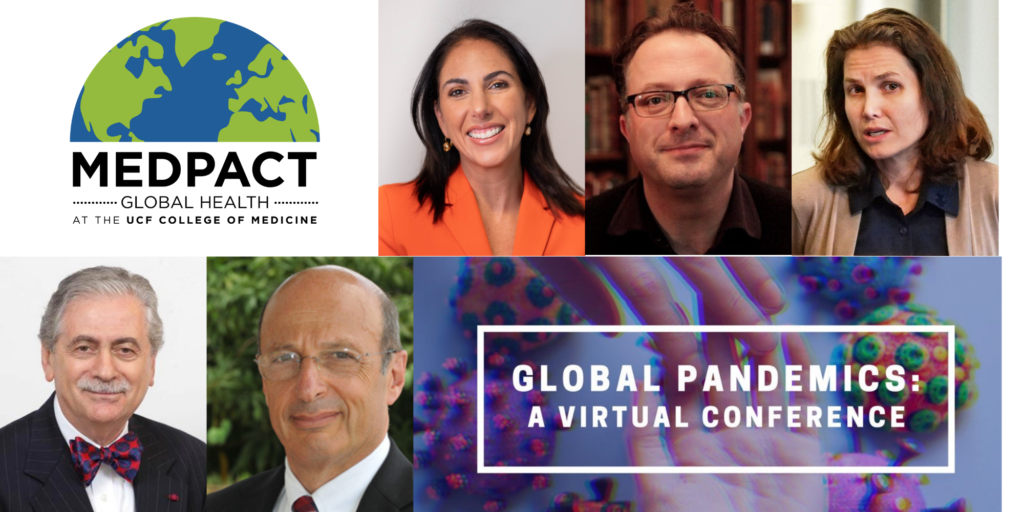VIRTUAL GLOBAL HEALTH CONFERENCE ON PANDEMICS GETS RECORD NUMBER OF ATTENDEES
- COLLEGE OF MEDICINE GLOBAL HEALTH MEDICAL STUDENTS
BY CHRISTIN SENIOR | FEBRUARY 1, 2021 3:22 PM
“Think globally. Act locally.” These are the words infectious disease expert Dr. Lilian Abbo said guided her pandemic response efforts at Miami’s Jackson Health System – the largest county health system in Florida.
“The reality in Florida will be very different than the reality in Colombia, or in Africa or in Europe,” Dr. Abbo said. “You really need to understand where you are — what can you work with, what are your resources, and how can you act quickly. But at the same time thinking of what’s going on all over the world.”
Dr. Abbo shared her experiences on the front lines of COVID-19 as the keynote speaker at the tenth annual UCF MedPACt Global Health Conference which drew a record number – over 260 — attendees this year. Organized by MedPACt (Medical Students Providing Across Continents), the conference was held virtually because of the pandemic on Jan. 16,
Dr. Abbo chronicled her experiences from preparing for local cases in Miami before the virus was first detected in the U.S. on January 21, 2020, to treating patients including her 84 year-old uncle, a rheumatologist, who died from the virus. She told attendees to never underestimate a pandemic, follow the science, and to do their part in addressing healthcare disparities that have caused underserved populations to suffer dramatically worse outcomes from COVID-19.
“This pandemic has disproportionately affected people with lower income, in particular, people of color, like black African Americans and Latinos with limited access to healthcare,” Dr. Abbo said. “Global access to healthcare is needed, and this is one of the greatest challenges for all of you as future doctors and specialists. I trust that many of you will come with innovations to really close these gaps and make this better.”
This year’s global health event drew interdisciplinary healthcare students, faculty, practitioners and volunteers from all over the U.S., including Virginia, New York, Georgia and Michigan.
Though virtual, the conference maintained many of its traditional features, including small breakout workshops on topics such as how adolescents are coping during the pandemic, contract tracing and the importance of taking individual responsibility to fight COVID-19. Panelists included Dr. Jennifer Prah Ruger, a leading scholar of global and domestic health policy and public health, Dr. Graham Mooney, an associate professor of the history of medicine at Johns Hopkins University School of Medicine, Dr. Benjamin Sachs, a senior lecturer at Harvard Medical School, and Dr. Eliot Sorel a physician and global health leader.
“The entire experience of going from planning an in-person conference last year to making it virtual was quite the journey to see unfold,” said Aaisha Gulani, second-year UCF medical student and conference co-chair. “It was like throwing darts in the dark — we had no idea what to expect of our attendees and if the pandemic would even be a relevant enough topic come this January.”
“Global access to healthcare is needed, and this is one of the greatest challenges for all of you as future doctors and specialists.”
Dr. lillian abo, infectious diseases chief
Gulani explained how the team assembled volunteers and planned the entire conference via Zoom meetings. Students worked with the College of Medicine’s Information Technology and Educational Technology departments to create a virtual platform that could host the conference and maintain traditional features like interactive workshops and poster presentations.
Dr. Judy Simms-Cendan, OB-GYN professor and faculty adviser to MedPACt, believes the challenges of staging a virtual conference paid off in terms of the number of attendees who were able to participate from their homes all across the U.S.
“I am super-proud of the students, this year more than ever, in putting together such a strong and relevant conference with a record number of attendees,” she said. “The medical students fully utilized the virtual platform to host the interactive panel discussions and run breakout rooms for networking round tables and workshops. It’s impressive to see how quickly they completely adapted the conference.”
The conference also had a record 23 research abstract submissions, allowing organizers to select three virtual “podium” presentations as well as several poster presentations. Viewers’ choice awards were done through surveys, which created more engagement with scientific sessions than in previous years.
The event’s $1,500 in proceeds will be donated to Pathlight HOME, a nonprofit organization chosen that provides permanent housing and economic opportunities for homeless and low-income individuals in Central Florida.
“This conference is a four-way win,” said Dr. Simms-Cendan. “The students learn how to put on a truly professional conference. The organizers and attendees have a deep dive into a significant global health topic in a way not covered in curriculum or the media. The proceeds benefit a truly important charity providing housing for the homeless, and the student organizers benefit from feeling able to tangibly help a truly needy population.”
